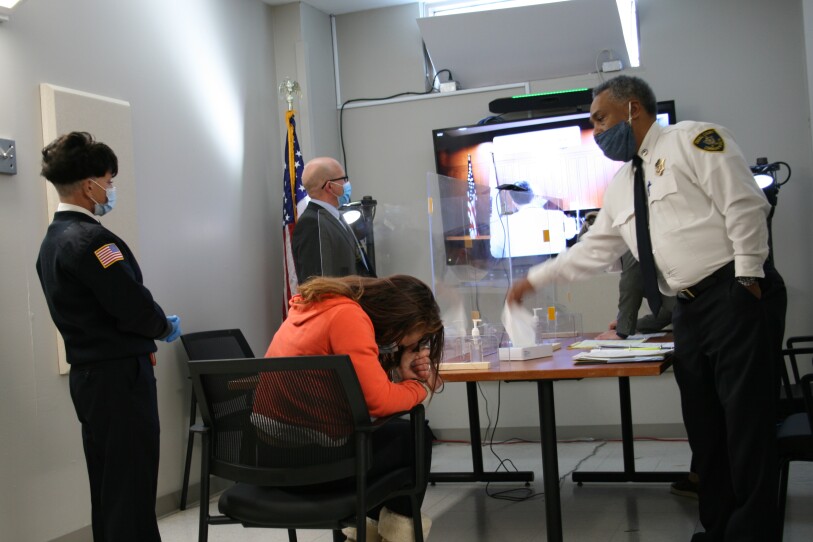Boston Mayor-elect Michelle Wu acknowledged concerns Thursday about the city's process for evicting people from tents around Melnea Cass Boulevard and Massachusetts Avenue, saying “from what I can tell, there are changes and improvements that are needed in terms of how we could better connect every individual to services and housing.” But she said she is not ready to commit yet to any specific policy changes.
Wu met with a small group of reporters after she was briefed on the ongoing public health crisis of people with substance use disorders and people without homes living in encampments at Mass. and Cass. The meeting with officials from various city agencies was Wu's first policy briefing since being elected mayor Tuesday night.
The mayor-elect — still a sitting City Council member — said her office is seeking “more information” about the detention process for hearings being held at the Suffolk County jail.
Wu also rejected the idea of arresting people waiting in line for substance use treatment in the area. "That would be unacceptable," she said. “There's clear understanding from within the folks at the table today that that’s not something that should ever happen."
Some people have been detained while waiting for services at nearby clinics as part of the city's recent push to clear out a tent encampment at Mass. and Cass.
Corrine Davis was arrested while waiting in line for methadone at a clinic on Bradston Street Wednesday morning, according to a police report. She was then taken to the Suffolk County jail without receiving a scheduled dose of methadone.
“Because she was arrested before she went to her medical appointment, she missed that medical appointment,” Tim Brown, an attorney with the Committee for Public Counsel Services (CPCS), told the court Wednesday. “She is now suffering significantly.”
Davis, 32, was brought in for an outstanding warrant from 2019, facing a charge of an attempt to commit a crime. While being booked, police say they found six pills in Davis’ jacket pocket, and Davis was charged with possession of a Class E drug. The police report identifies the pills as Gabapentin, an anti-seizure and nerve pain prescription drug.

Brown says he and other CPCS attorneys at the hearings have represented multiple clients who were brought in while attempting to secure treatment for substance use disorder.
“When people are in line waiting for services, and they're arrested and those services are interrupted, it seems antithetical to what the claimed purposes of this court are,” Brown said in an interview with GBH News Wednesday, “to get people the help that they need.”
In court, Judge Paul Treseler suggested ordering Davis to stay away from Mass. and Cass, on the grounds that he didn’t want “somebody who has a long record of addiction to be hanging out in the middle of the most drug-infiltrated area in New England.”
But Davis, who receives substance use treatment and outreach help in the area from Pine Street Inn and Healthcare for the Homeless, would then be unable to access her treatment, Brown argued.
“She got herself into a medical government program, she got herself lined up with housing,” Brown responded. “Being arrested today has been disruptive to her treatment, it’s been destabilizing in the most basic way. She was doing well, she was connected to the services she needs.”
Brown said Davis never received the 2019 warrant because she doesn't have a home.
Treseler ultimately gave Davis a new court date to report for her previous warrant and permission to continue receiving services at Mass. and Cass, as long as she provided weekly negative drug tests to the methadone clinic.
The court hearings, which the city refers to as a “Community Response Session,” are part of a larger executive order issued by acting Mayor Kim Janey to “protect the public health and public safety of those living in inhumane and unsafe conditions” at Mass. and Cass, and to “address those who prey upon them,” according to a statement from Janey's office to GBH News Tuesday.
But the hearings are technically convened under a separate executive order authorized by Judge Roberto Ronquillo, Jr., the Chief Justice of the Boston Municipal Court, effective Nov. 1 and with no set end date.
With an eye toward the underlying crises at Mass. and Cass, Wu emphasized the need to provide low-threshold affordable housing for people suffering homelessness and transitional options in the interim.
“Even though we have shelter beds that are available, there are barriers to accessing shelter, and ... [shelters] are not settings that everyone feels safe in,” Wu told reporters. The better approach, she said, “is when individuals are connected to transitional housing, whether that is through vacant hotel rooms that are repurposed and wrapped around with medical and public health services, or in buildings that can be retrofit to have more of a hotel or apartment-like setting with services rather than an open shelter.”

The city’s “general cleanup” at Mass. and Cass has continued throughout the week, with new eviction notices placed on the few remaining tents ordering the occupants to clear out by Friday or have property disposed of by the city. Eviction notices were first put on tents at Mass. and Cass as early as Sunday.
Wu agreed with Janey that tents are not a safe living environment, particularly in the winter months. She told reporters she would focus on providing alternatives.
“There's a reason why individuals have chosen to be on the street rather than going into the empty shelter beds,” Wu said. “We need to continue working with all of our providers and with the city's resources to set up those transitional housing spaces.”
Saraya Wintersmith contributed reporting to this story.





